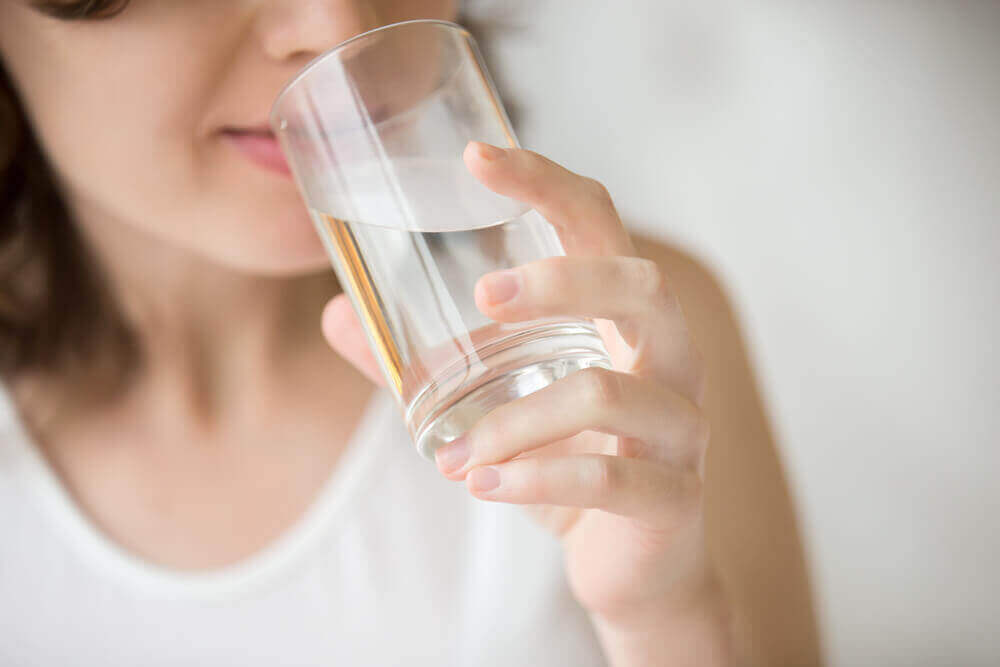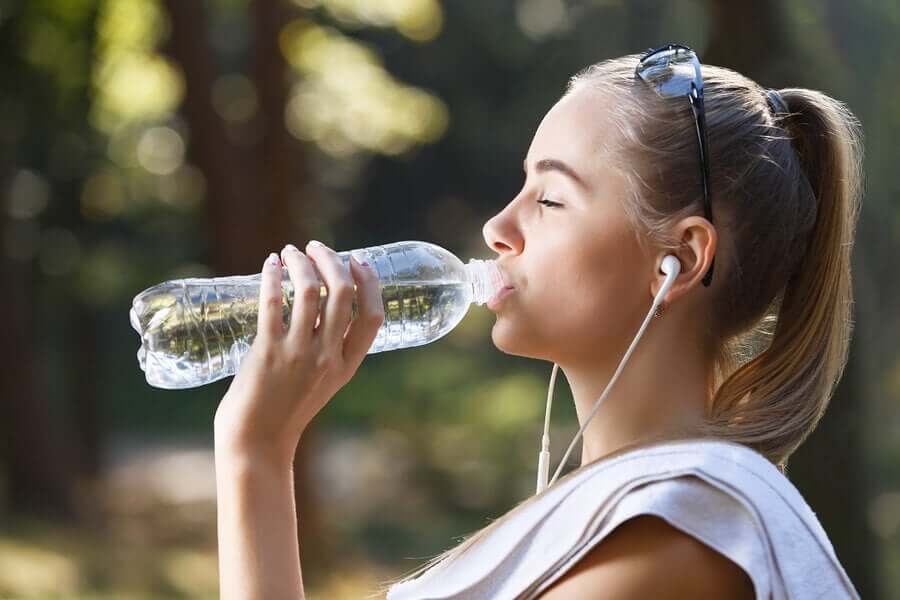The Effects of Drinking Water on an Empty Stomach


Reviewed and approved by the doctor Karla Henríquez
Drinking water on an empty stomach is deeply rooted in the culture of the majority of Japanese people. While genes have a major influence, some claim that this habit has helped them stay thin, in shape, and healthy. Unlike other places, in Japan, they don’t have high measures of obesity or diabetes. Although we can’t say for sure, these habits could be linked to their physical well-being
Drinking water on an empty stomach is beneficial for the whole body because it helps us to hydrate well from the first hour of the day. In addition, it makes us feel energized, clear-headed, and even fuller by the time we finish breakfast.
However, don’t forget that this excellent habit doesn’t replace the treatment that the doctor may prescribe in case you have any disease or special physical condition. Therefore, drink water, but also follow the professional’s instructions. In addition, remember to space your water consumption throughout the day. This way, you will reap all the benefits of good hydration.
Having said that, let’s get down to business: How happens when we drink water on an empty stomach?
1. It allows you to release toxins from your body
Water naturally stimulates intestinal movement.

During the night, your body goes through a process of repair and disposes of all of the toxins. For this reason, when you drink water on an empty stomach early in the day, you help the body to hydrate, but also to get rid of harmful toxins (through urine).
Read also: How Much Water You Should Drink According To Your Weight
2. It improves your metabolism and helps you lose weight healthily
According to hypotheses, drinking water while fasting may help your metabolism to increase by at least 24%. If you’re on a strict diet, a higher rate of metabolism means that your digestive system will work in your favor.
If you prioritize water consumption over any industrial beverage, you’ll be able to achieve and maintain a healthy weight, among other things, as the scientific literature points out.
In addition, drinking a glass of water (calmly) before a meal or snack will make you feel much less hungry and greatly reduce food cravings.
Read also: How to Make 5 Teas to Detox Your Colon
3. It helps you to lose weight in a healthy way
When you drink water on an empty stomach, it helps you remove toxins from your body and improves your digestive system.
This will make you feel much less hungry and greatly reduce the urge to snack.
At the same time, this will help you avoid weight gain caused by eating in excess because of anxiety and other factors.
4. It alleviates acid and indigestion
Indigestion tends to be provoked by the acid that you have in your stomach. If you suffer regularly from acid indigestion, drinking water on an empty stomach may help improve the problem.
When ingesting water on an empty stomach, the acid that has come up is pushed down and dissolved. This helps solve the problem and also prepares your stomach for eating breakfast. However, if pain and heartburn persist, see a doctor to rule out any disease such as ulcers, gastritis, or other gastrointestinal problems.
5. It improves the appearance of your complexion
Dehydration is one of the principal causes of the appearance of wrinkles and large pores in the skin. For this reason, consuming enough water throughout the day will help you to have healthy and beautiful skin.

6. It boosts the health, shine and softness of your hair
Besides affecting your skin, dehydration can have a serious effect on the growth of your hair. Drinking water is very important if you want to have healthy hair on the inside as well as the outside. Water constitutes approximately a quarter of the total weight of a hair root. If you don’t drink enough, your hair will become very fine and brittle.
Although there’s no scientific evidence, it’s said that if you do it on an empty stomach, you can improve the appearance and health of your hair in a short time.
7. It prevents kidney stones and bladder infections
Drinking water on an empty stomach is very important when it comes to the health of your bladder and kidneys. Doing this causes your body to more easily dilute acid that causes kidney stones.
The more water you drink, the more you’ll protect your body from various types of infections produced by the accumulation of toxins that your bladder produces. Note that it’s not a matter of overdoing it and drinking large amounts of water at one time, but of maintaining adequate hydration throughout the day.
8. It strengthens your immune system
Water intake cleanses and balances your lymph system. This makes your immune system function much better. All of this translates into a decrease in the frequency with which you get sick or less long-lasting aches and pains.
How should I drink water on an empty stomach?

All you have to do is drink (calmly) one or two glasses of water when you wake up, without having brushed your teeth or eaten anything. Wait at least 45 minutes before eating breakfast.
Although drinking one or two glasses of water on an empty stomach may not be easy at first because you’re not used to it, the truth is that it’ll help you a lot. All you have to do is start with the amount your body can handle and gradually increase it until you reach 2 glasses.
Remember that drinking water is one more habit that you should incorporate into a healthy lifestyle. This is because although it’s very beneficial for health, it needs to go hand in hand with a balanced diet, a proper restm and exercise routine, among other habits, in order to provide stable benefits over time.
All cited sources were thoroughly reviewed by our team to ensure their quality, reliability, currency, and validity. The bibliography of this article was considered reliable and of academic or scientific accuracy.
- Jéquier, E., & Constant, F. (2010). Water as an essential nutrient: The physiological basis of hydration. European Journal of Clinical Nutrition. https://doi.org/10.1038/ejcn.2009.111 Disponible en: https://www.foothill.edu/sustainability/docs/WaterAsEssentialNutrient.pdf
- Iglesias Rosado C., Villarino Marín A. L., Martínez J. A., Cabrerizo L., Gargallo M., Lorenzo H. et al . Importancia del agua en la hidratación de la población española: documento FESNAD 2010. Nutr. Hosp. [Internet]. 2011 Feb [citado 2018 Oct 24] ; 26( 1 ): 27-36. Disponible en: http://scielo.isciii.es/scielo.php?script=sci_arttext&;pid=S0212-16112011000100003&lng=es.
- Patrick Ritz, Gilles Berrut; The Importance of Good Hydration for Day-to-Day Health, Nutrition Reviews, Volume 63, Issue suppl_1, 1 June 2005, Pages S6–S13, https://doi.org/10.1111/j.1753-4887.2005.tb00155.x
- Popkin, B. M., D’Anci, K. E., & Rosenberg, I. H. (2010). Water, hydration, and health. Nutrition reviews, 68(8), 439-58.
This text is provided for informational purposes only and does not replace consultation with a professional. If in doubt, consult your specialist.








